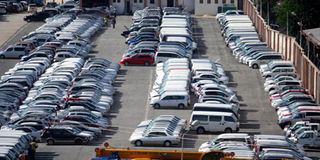We’ll not lift rule on car imports, says Kebs

GIDEON MAUNDU | NATION
Hundreds of imported cars await to be cleared at a Clearing Freight Station after being off-loaded from a ship at the port of Mombasa.
The Kenya Bureau of Standards on Monday maintained that vehicles which were imported into the country without conforming to the eight-year rule would either be destroyed or shipped back to the country of origin.
The Kenya Revenue Authority recently raised issue with importation of about 500 over-age vehicles, which were cleared to enter into the local market after allegedly being exempted from the rule by the Industrialisation ministry.
The case has since been taken up by the Kenya Anti-Corruption Commission, which is investigating possible collusion between importers, customs officers and officials of the standards agency.
“The rules are clear that such vehicles are either shipped back or destroyed. There will be no discrimination in the application of this law,” Kebs managing director Joseph Koskei told journalists in Mombasa.
He was speaking when he opened a five-day capacity building seminar for laboratory testing officers from Kebs and various firms accredited by the agency to offer testing services.
He warned firms that collude with unscrupulous traders to tamper with laboratory results to favour certain individuals that stern measures would be taken against them.
The MD also said fake Kebs quality stamps that were circulating in the manufacturing sector might have been obtained through the aid of the agency’s employees.
Corrupt officials
“In the past we have had incidents where a laboratory technician tampers with the results of a sample and provides wrong results knowing too well that the results are incorrect,” he noted.
He added: “The moment you provide such results you should know that they will harm consumers including yourself. Those charged with the responsibility should exercise proper ethics and high integrity.”
Kebs is in the process of accrediting more agencies to offer testing laboratory services in the region to increase capacity in tandem with growing business within the East Africa Community, according to Mr Joel Gikubu, chief manager and head of testing.
“After the coming into effect of the EAC common market protocol we anticipate that demand for laboratory testing services will shoot up,” he said.



